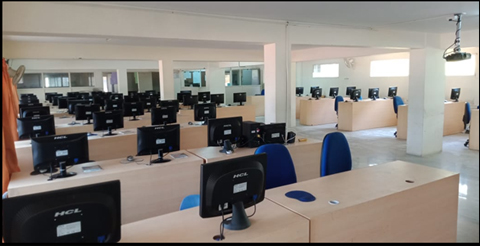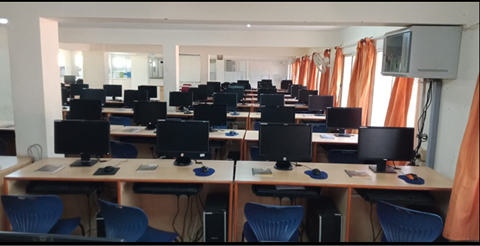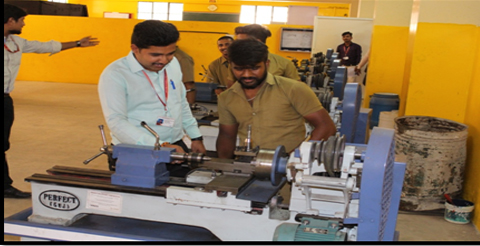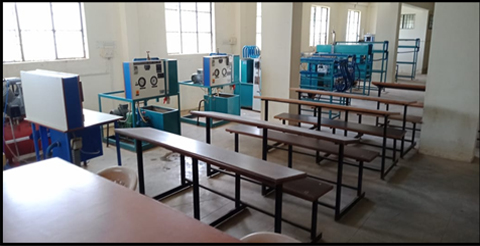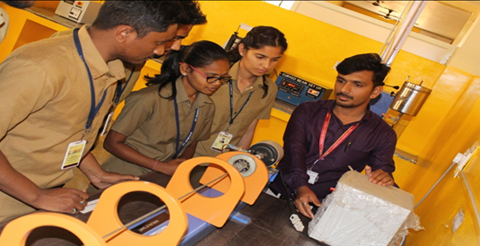Laboratories
Engineering Graphics
- The subject is intended to gain fundamental knowledge of engineering drawing to the student of all discipline of engineering
- Engineering drawing is used to project details of a component with their salient features
- To develop the ability of producing engineering drawings using drawing instruments.
- In fact the engineering drawing is more useful in mechanical industries for the fabrication, machining and automation purposes
Computer Aided Machine Drawing
- Machine drawing is a pictorial representation of machine or machine components or the part of a product which provides outline/inline detail of a product including how it is going to be manufactured with certain rules.
- To familiarize the students with Indian Standards on drawing practices.
- To impart knowledge of thread forms, fasteners, keys, joints and couplings.
- To make the students understand and interpret drawings of machine components so as to prepare assembly drawings either manually and using CAD packages.
- To acquire the knowledge of limits, tolerances and fits pertaining to machine drawings.
- This drawing is the way of communication between you and the worker/ designer/ customer/ manufacturer/ engineer to get the desirable outcome in an efficient way.
Material Testing Lab
- Mechanical engineering students will be aware of determining the properties of engineering materials and their applications.
- The students conduct experiments on Universal testing machine, various hardness testing machines (Rockwell, Brinell, Ticker’s), Wear, Impact, fatigue and Torsion testing machines.
- To learn the concept of the preparation of samples to perform characterization such as microstructure, volume fraction of phases and grain size.
- To learn material failure modes and the different loads causing failure.
- To learn the concepts of improving the mechanical properties of materials by different methods like heat treatment, surface treatment etc.
Workshop and Machine Shop Practice
- The students are trained to get basic workshop knowledge like fitting. The fitting models like square shape, V –shape, square-shape, Dove tail shape. This basic knowledge will help the students to do the projects.
- The machine shop is equipped with centre lathe, radial drilling machines, shapers, milling machines and surface grinding machines
- To provide an insight to different machine tools, accessories and attachments.
- To train students into fitting and machining operations to enrich their practical skills.
- By gaining this lab knowledge students can start their own mechanical industries like fabrication of components and also encouraging them to become entrepreneurs.
Mechanical Measurements and Metrology Lab
- This lab is associated with the science of mechanical measurements and metrology and also deals with mechanical instruments and equipment’s which include all theoretical and practical aspects of measurements.
- The scope of this lab is measurement in building, aerospace, auto motives, testing and validation methods in various industries.
- To illustrate the use of various measuring tools measuring techniques.
- It is also used in measurement in scientific and industry activities and also helpful for calibration, sensors and legal metrology.
Fluid Machines and Machinery Lab
- This course will provide a basic understanding of flow measurements using various types of flow measuring devices, calibration and losses associated with these devices.
- Energy conversion principles, analysis and understanding of hydraulic turbines and pumps will be discussed. Application of these concepts for these machines will be demonstrated. Performance analysis will be carried out using characteristic curves.
Energy Lab
- In this Energy lab, the students are capable of understanding the usage of conversion of energy from one form to another form by the design and operation of internal combustion engines affecting their performance, operation, fuel consumption and environmental effects.
- This course will provide a basic understanding of fuel properties such as viscosity, flash point, fire point, calorific value.
- Energy conversion principles, analysis and understanding of I C Engines will be discussed. Application of these concepts for these machines will be demonstrated. Performance analysis will be carried out using characteristic curves.
- The laboratory is equipped with test rigs and instruments to evaluate the performance, emissions and combustion characteristics of the system fuelled with these alternative fuels or their blends with conventional petrol and diesel.
Heat Transfer Lab
- The experiments in the heat transfer laboratory help the students to understand all the 3 modes of heat transfer, namely conduction, convection and radiation practically.
- The primary objective of this course is to provide the fundamental knowledge necessary to understand the behavior of thermal systems.
- This course provides a detailed experimental analysis, including the application and heat transfer through solids, fluids, and vacuum. Convection, conduction, and radiation heat transfer in one and two dimensional steady and unsteady systems are examined.
Modelling and Analysis Lab
- In the modeling and analysis lab students understand the concepts of Finite Element and stress analysis of the bars, beams, trusses, structures & also about the dynamics & thermal Analysis using ANSYS software.
- To understand the different kinds of analysis and apply the basic principles to find out the stress and other related parameters of bars, beams loaded with loading conditions.
- To lean to apply the basic principles to carry out dynamic analysis to know the natural frequency of different kind of beams.
Computer Integrated Manufacturing Lab
- To expose the students to the techniques of CNC programming and cutting tool path generation through CNC simulation software by using G-Codes and M-codes.
- To educate the students on the usage of CAM packages.
- To make the students understand the importance of automation in industries through exposure to FMS, Robotics, and Hydraulics and Pneumatics.
Design Lab
- In this lab a prominent little bit information about the design of machine components will import through experiments like balancing of rotating mass, vibration equipment, governors and photo elasticity experimental set up.
- To understand the natural frequency, logarithmic decrement, damping ratio and damping.
- To understand the balancing of rotating masses.
- To understand the concept of the critical speed of a rotating shaft.
- To understand the concept of stress concentration using Photo elasticity.
- To understand the equilibrium speed, sensitiveness, power and effort of Governor.

